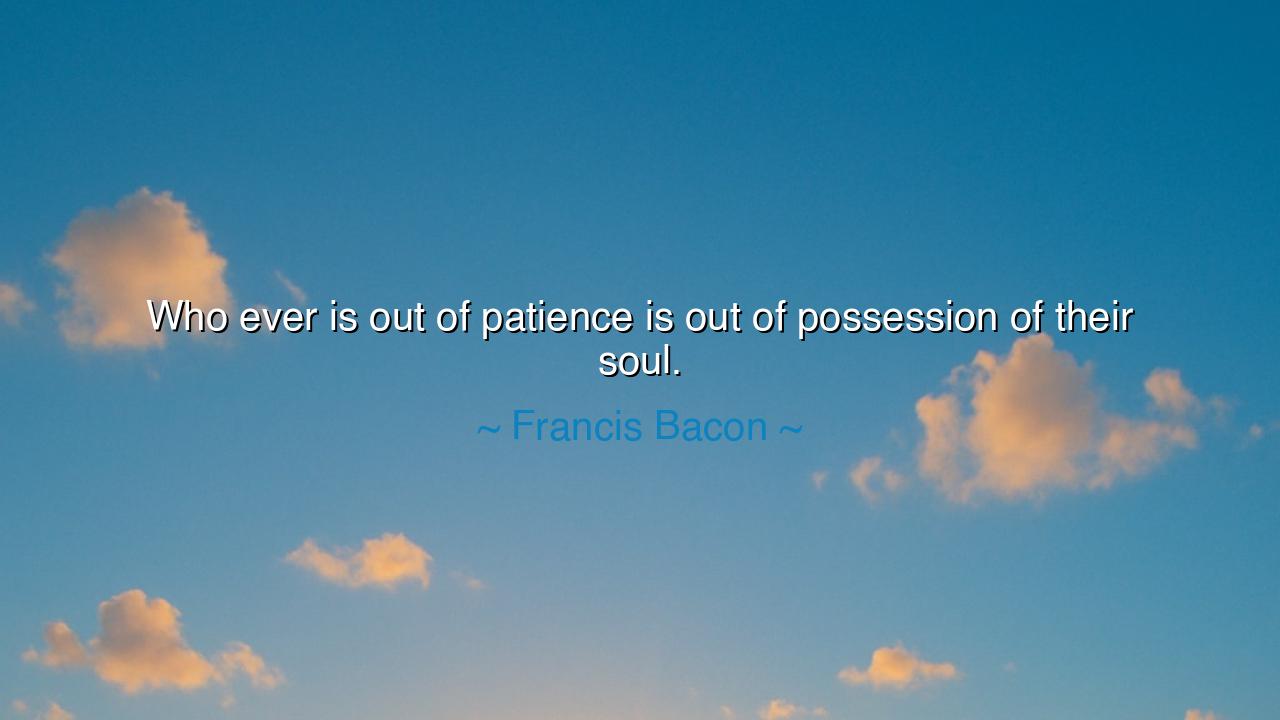
Who ever is out of patience is out of possession of their soul.






Hear the grave and enduring wisdom of Francis Bacon, who proclaimed: “Who ever is out of patience is out of possession of their soul.” These words pierce the heart like an arrow, for they reveal that when patience departs, the soul itself is shaken loose from its throne. Anger, haste, and frenzy seize the reins, and man, who was meant to be master of himself, becomes instead a servant of his passions. To lose patience is not a small failing, but a surrender of the very citadel of one’s spirit.
The origin of this teaching lies in Bacon’s deep meditation upon the nature of wisdom and governance—both of nations and of the self. As a statesman and philosopher, he saw how often men were undone not by enemies, but by their own lack of restraint. A hasty word could ruin years of diplomacy, a rash decision could wreck entire enterprises. He discerned that patience is not merely a private virtue but the very anchor of the soul, without which judgment, reason, and peace are swept away like a ship without ballast.
The ancients too bore witness to this truth. Think of Achilles, the mightiest of warriors. His wrath, born of wounded pride, led him to withdraw from battle, bringing ruin upon his comrades, and when at last he returned, it drove him to desecrate the body of Hector. Here was a hero out of patience, and thus out of possession of his soul. Contrast him with Odysseus, who through long years of wandering endured storms, temptations, and grief, yet held fast to his inner discipline. By his patience, he preserved both his life and his kingdom.
History too offers its mirrors. Consider George Washington, who in the bitter winter at Valley Forge held together an army half-starved, half-frozen, and near collapse. Had he given in to rage or despair, the Revolution itself might have dissolved. But through patience, he kept possession of his soul and gave strength to his men. It was not the flash of the sword alone, but the quiet endurance of spirit, that secured freedom. His example shows the sweetness of Bacon’s counsel: that mastery of self is the root of all true victory.
The meaning of Bacon’s saying is therefore both inward and outward. Inward, it warns us that the soul is not a fortress made of stone, but one kept by watchful vigilance. Lose patience, and anger or fear rushes in to overthrow it. Outward, it reminds us that the man who cannot govern himself is unfit to govern others, for how shall he lead when his soul is a storm? Patience is thus the shield of the soul and the guardian of its dominion.
The lesson for future generations is clear: treasure patience as the safeguard of your spirit. When provoked, do not answer in haste; when delayed, do not gnash your teeth; when suffering comes, endure with dignity. For to keep possession of your soul is greater than to conquer cities, and to lose it is a defeat more bitter than death.
Therefore, let your actions be thus: in every trial, remember that you are keeper of your own spirit. Practice stillness when tempted to rage, and gentleness when pressed by hardship. Teach your children that greatness lies not in swiftness of anger, but in slowness to wrath. For as Francis Bacon declared, he who is out of patience is out of possession of his soul—but he who endures in patience holds in his hand the key to peace, wisdom, and true mastery of life.






AAdministratorAdministrator
Welcome, honored guests. Please leave a comment, we will respond soon